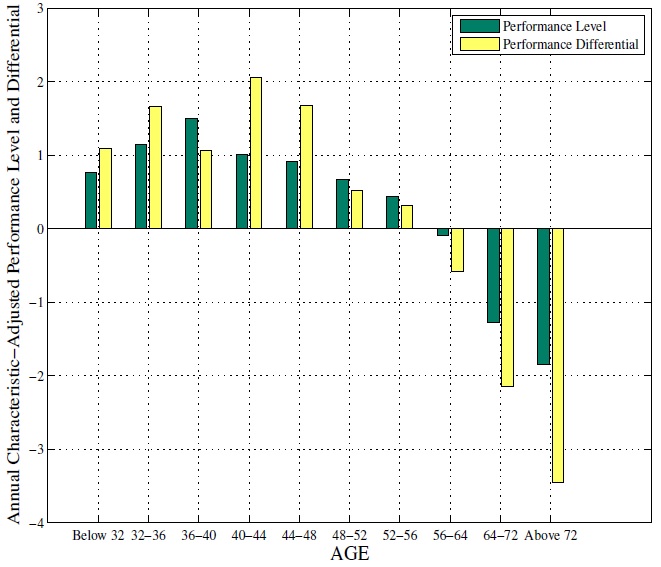How Investing Ability Changes With Age
Submitted by Silverlight Asset Management, LLC on January 27th, 2019
Would you trust a teenager to manage your life savings? What about a 94-year old?
Most activities have a certain age where folks enter their prime.
For instance, if you’re a professional football player, that's considered the mid-to-late 20s—when players have a few years of NFL experience and physical skills remain near peak levels.
When do investors reach their "prime?" Mid-to-late 20’s, middle-age, over 50?
George Korniotis and Alok Kumar’s groundbreaking study, “Do Older Investors Make Better Investment Decisions?” considered: (i) whether age, experience and investment knowledge would impact an investors’ portfolio holdings, and (ii) the relation between age, investment experience and investment skill.
The study concluded that “older and more experienced investors hold less risky portfolios, exhibit stronger preference for diversification, trade less frequently, exhibit a greater propensity for year-end tax loss selling, and exhibit weaker behavioral biases…Thus, their choices reflect greater knowledge about investing.”
However, “older investors have worse investment skill, where the skill deteriorates sharply around the age of 70.” In fact, “older investors earn about 3-5% lower annual return on a risk-adjusted return basis.”
The mean age of investors in the Korniotis and Kumar study was 50, while those considered in the “older” age group were 75-94.
Even though older investors are likely to adhere to common investment “rules of thumb,” the effectiveness of applying those principles appears to be hampered by cognitive aging.
Cognitive aging refers to the decline in cognitive abilities (i.e. reasoning, memory, attention, learning, problem-solving skills, etc.) as one ages.
Compounding the cognitive aging issue is overconfidence.
Michael Finke, John Howe and Sandra Huston, authors of the study “Old Age and the Decline in Financial Literacy,” found a mix of overconfidence and reduced abilities explained the poor credit and investment choices made by older subjects. In their study, financial literacy scores declined by about 1% each year after age 60, but subjects’ confidence in their own decision-making did not decline with age.
Takeaway: many people have an investing blind-spot after age 60. They are more vulnerable to poor financial decisions, and aren't consciously aware of this.
You may wonder: What about Warren Buffett (age 88) and Charlie Munger (age 95)?
Berkshire Hathaway’s dynamic duo remain mentally sharp. You know that if you’ve tuned into their Q&A performances at recent annual shareholder meetings.
Buffett managed Berkshire’s stock portfolio by himself for decades and produced sterling results. He remains active today. Yet he’s also smart enough to hedge himself, hiring two younger investment managers to help him. Todd Combs (now age 46) and Ted Weschler (age 56) were hired in 2010 and 2011, respectively.
A few years ago, Buffett told CNBC that hiring Combs and Weschler is “one of the best decisions Charlie and I have ever made.” He added, “they’ve made more money than I would have with the capital they’re overseeing."
Both Combs and Weschler have outperformed the S&P 500 since being hired, which is better than Buffett has done. At the end of 2017, the two oversaw approximately $25 billion.
Combs was in his late-30s when he cold called Charlie Munger and struck up a relationship that helped land him one the most plum jobs in the investment business.
Weschler originally met Buffett after making the top bid in a charity auction to win a private lunch (he paid $2,626,311 in 2010). Weschler joined Berkshire when he was 50.
As has been the case throughout his illustrious career, Buffett offers a great example in how he has handled aging. By soliciting the help of a younger generation, he's not only improved Berkshire's bottom-line, but also his peace of mind. He and other Berkshire shareholders know there's a solid back-up plan in place. His younger lieutenants share his investing philosophy, and will likely carry the torch well long-term.
Buffett also likely tapped Combs and Weschler during their prime investing years, as evidenced by the following table (source: Korniotis and Kumar, 2010).

This figure shows the risk-adjusted performance level and performance differential, conditional upon age.
Performance differential is the change in performance between the last 3 and the first 3 years of the sample period.
For an investor to be at their best, they must have practical investment knowledge, which increases with both age and experience. Likewise, they must have the requisite investment skill, i.e. be at a stage in life before the effects of cognitive aging hamper decision-making capacity.
If there is an "investing prime," it appears to be between the ages of 32 and 56.
Originally published by Forbes. Reprinted with permission.
This material is not intended to be relied upon as a forecast, research or investment advice. The opinions expressed are as of the date indicated and may change as subsequent conditions vary. The information and opinions contained in this post are derived from proprietary and nonproprietary sources deemed by Silverlight Asset Management LLC to be reliable, are not necessarily all-inclusive and are not guaranteed as to accuracy. As such, no warranty of accuracy or reliability is given and no responsibility arising in any other way for errors and omissions (including responsibility to any person by reason of negligence) is accepted by Silverlight Asset Management LLC, its officers, employees or agents. This post may contain “forward-looking” information that is not purely historical in nature. Such information may include, among other things, projections and forecasts. There is no guarantee that any of these views will come to pass. Reliance upon information in this post is at the sole discretion of the reader.
Testimonials Content Block
More Than an Investment Manager—A Trusted Guide to Financial Growth
"I’ve had the great pleasure of having Michael as my investment manager for the past several years. In fact, he is way more than that. He is a trusted guide who coaches his clients to look first at life’s bigger picture and then align their financial decisions to support where they want to go. Michael and his firm take a unique and personal coaching approach that has really resonated for me and helped me to reflect upon my core values and aspirations throughout my investment journey.
Michael’s focus on guiding the "why" behind my financial decisions has been invaluable to me in helping to create a meaningful strategy that has supported both my short-term goals and my long-term dreams. He listens deeply, responds thoughtfully, and engages in a way that has made my investment decisions intentional and personally empowering. With Michael, it’s not just about numbers—it’s about crafting a story of financial growth that has truly supports the life I want to live."
-Karen W.
Beyond financial guidance!
"As a long-term client of Silverlight, I’ve experienced not only market-beating returns but also invaluable coaching and support. Their guidance goes beyond finances—helping me grow, make smarter decisions, and build a life I truly love. Silverlight isn’t just about wealth management; they’re invested in helping me secure my success & future legacy!"
-Chris B.
All You Need Know to Win
“You likely can’t run a four-minute mile but Michael’s new book parses all you need know to win the workaday retirement race. Readable, authoritative, and thorough, you’ll want to spend a lot more than four minutes with it.”
-Ken Fisher
Founder, Executive Chairman and Co-CIO, Fisher Investments
New York Times Bestselling Author and Global Columnist.
Packed with Investment Wisdom
“The sooner you embark on The Four-Minute Retirement Plan, the sooner you’ll start heading in the right direction. This fun, practical, and thoughtful book is packed with investment wisdom; investors of all ages should read it now.”
-Joel Greenblatt
Managing Principal, Gotham Asset Management;
New York Times bestselling author, The Little Book That Beats the Market
Great Full Cycle Investing
“In order to preserve and protect your pile of hard-earned capital, you need to be coached by pros like Michael. He has both the experience and performance in The Game to prove it. This is a great Full Cycle Investing #process book!”
-Keith McCullough
Chief Executive Officer, Hedgeye Risk Management
Author, Diary of a Hedge Fund Manager
Clear Guidance...Essential Reading
“The Four-Minute Retirement Plan masterfully distills the wisdom and experience Michael acquired through years of highly successful wealth management into a concise and actionable plan that can be implemented by everyone. With its clear guidance, hands-on approach, and empowering message, this book is essential reading for anyone who wants to take control of their finances and secure a prosperous future.”
-Vincent Deluard
Director of Global Macro Strategy, StoneX

